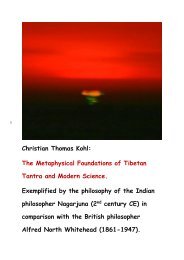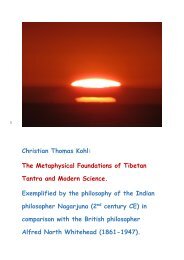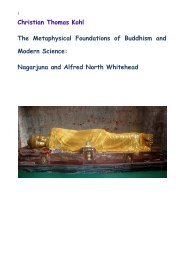The Metaphysical Foundation of Buddhism and Modern Science
You also want an ePaper? Increase the reach of your titles
YUMPU automatically turns print PDFs into web optimized ePapers that Google loves.
Between them, Plato <strong>and</strong> Aristotle succeed in illustrating the chief<br />
connections between science <strong>and</strong> philosophy. <strong>The</strong> emphasis <strong>of</strong> science is<br />
upon observation <strong>of</strong> particular occurences, <strong>and</strong> upon inductive<br />
generalization, issuing in wide classifications <strong>of</strong> things according to their<br />
modes <strong>of</strong> functioning, in other words according to the laws <strong>of</strong> nature<br />
which they illustrate. <strong>The</strong> emphasis <strong>of</strong> philosophy is upon generalizations<br />
which almost fail to classify by reason <strong>of</strong> their universal application. For<br />
example, all things are involved in the creative advance <strong>of</strong> the Universe,<br />
that is, in the general temporality which affects all things, even if at all<br />
times they remain self-identical. Thus the consideration <strong>of</strong> weight led<br />
Aristotle to his four-fold classification.<br />
Now Plato had already emphasized the importance <strong>of</strong> this Aristotelian<br />
notion <strong>of</strong> classification, that is to say, <strong>of</strong> 'division' as he called it.<br />
Perhaps indeed he invented the method. It would have been quite in<br />
accordance with his clear-cut intellectual subtlety to have done so. We<br />
find in his dialogues the first explicit formulations <strong>of</strong> the science <strong>of</strong><br />
Logic. But his applications <strong>of</strong> the method are feeble in the extreme, from<br />
the point <strong>of</strong> view <strong>of</strong> the advancement <strong>of</strong> natural science. Whereas<br />
Aristotle in his life's work seized upon the general notion <strong>of</strong><br />
classification, he gave a masterly analysis <strong>of</strong> the complexities inherent in<br />
the mutual relation <strong>of</strong> classes. He also applied his theoretical doctrine to<br />
the immense material to be collected by direct observation in the field<br />
<strong>of</strong> zoology, physics, sociology. Indeed we must trace to him nearly all our<br />
special sciences, both the natural sciences, <strong>and</strong> those concerning the


















